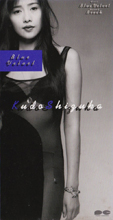
"Blue Velvet" is a song recorded by Japanese singer Shizuka Kudo for her thirteenth studio album, I'm Not. It was released by Pony Canyon as the album's leading single on May 28, 1997. It served as the third ending theme song to the Fuji Television anime series Dragon Ball GT, from episode 42 to episode 50. Out of all the artists that have contributed to the series' soundtracks, Kudo is the only one who is unaffiliated with a Being Inc. label. Kudo, who is a self-proclaimed Dragon Ball fan, received an autographed hand-drawn illustration of Goku from series creator Akira Toriyama for her 28th birthday.
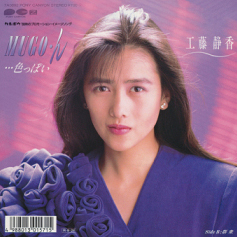
"Mugon... Iroppoi" is a song recorded by Japanese singer Shizuka Kudo. It was released as a single by Pony Canyon on August 24, 1988. It was used in the Kanebo Cosmetics televised ad campaign of fall 1988, for which the catchphrase was "n... Iroppoi". Kudo made her first appearance on the 39th Kōhaku Uta Gassen and performed "Mugon... Iroppoi" for the Red team. The song was nominated for the Grand Prix at the 30th Japan Record Awards.
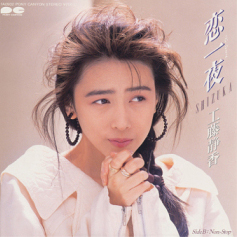
"Koi Hitoyo" is a song recorded by Japanese singer Shizuka Kudo, released on December 28, 1988, by Pony Canyon as the lead single from her third studio album Joy (1989). Almost a year later to the day, Kudo marked her second appearance on Kōhaku Uta Gassen by performing "Koi Hitoyo".

"Arashi no Sugao" is a song recorded by Japanese singer Shizuka Kudo, released as a single by Pony Canyon on May 3, 1989. Although the song is one of Kudo's most recognizable hits, as well as widely considered to be her breakout hit, and despite the fact that it was included on the compilation album Harvest, released later that same year, it was never featured on any of Kudo's studio albums. At the fourth Japan Gold Disc Awards, "Arashi no Sugao" was one of the five recipients of the award for Best Single of the Year. In 2015, DAM asked their users to select their favorite Shizuka Kudo songs to sing karaoke to and compiled a top ten list; "Arashi no Sugao" was ranked number seven.

"Kuchibiru Kara Biyaku" is a song recorded by Japanese singer Shizuka Kudo for her fifth studio album, Rosette. It was released by Pony Canyon as the album's lead single on January 10, 1990. Although it was not officially released on vinyl, a few copies were produced for promotional use. Kudo performed the song on the 41st Kōhaku Uta Gassen, marking her third appearance on the program. In 2015, DAM asked their users to select their favorite Shizuka Kudo songs to sing karaoke to and compiled a top ten list; "Kuchibiru Kara Biyaku" came in at number six.
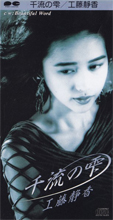
"Senryū no Shizuku" is a song recorded by Japanese singer Shizuka Kudo. It was released as a single through Pony Canyon on May 9, 1990. It marks the debut of Kudo as a songwriter. The song was featured on commercials for Taiyo Yuden That's cassette tapes. Similarly to her previous single, "Kuchibiru Kara Biyaku", a limited number of 7-inch vinyls of the single were produced for promotional use. "Senryū no Shizuku" has never appeared on an original album, but was included in the compilation album Unlimited (1990).

"Watashi ni Tsuite" is a song recorded by Japanese singer Shizuka Kudo. It was released as a single by Pony Canyon on September 21, 1990. The song made its first album appearance on the compilation album Unlimited, released that same year.
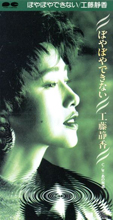
"Boya Boya Dekinai" is a song recorded by Japanese singer Shizuka Kudo for her sixth studio album, Mind Universe. It was released by Pony Canyon as the album's lead single on January 23, 1991.

"Please" is a song recorded by Japanese singer Shizuka Kudo. It was originally intended to be included on Kudo's sixth studio album, Mind Universe, but was dropped at the last minute. The song was released as a single by Pony Canyon shortly thereafter on May 15, 1991. It made its first album appearance on the compilation album Intimate.
"Metamorphose" is a song recorded by Japanese singer Shizuka Kudo. It is the theme song for the CX television series Nandara Mandara, which starred Kudo herself. It was released as a single through Pony Canyon on October 23, 1991. "Metamorphose" made its first album appearance on the compilation album, Intimate. Kudo performed the song on her fourth appearance on Kōhaku Uta Gassen. In 2015, DAM asked their users to select their favorite Shizuka Kudo songs to sing karaoke to and compiled a top ten list; "Metamorphose" was one of the top vote-getters, rounding up the list at number ten.

"Mechakucha ni Naite Shimaitai" is a song recorded by Japanese singer Shizuka Kudo, from her seventh studio album, Trinity. It was released through Pony Canyon as the album's lead single on January 29, 1992. Kudo performed the song on the 43rd Kōhaku Uta Gassen, marking her fifth consecutive appearance on the annual show. In 2007, Kudo recorded a self-cover of the song with a jazz arrangement for the compilation album Shizuka Kudo 20th Anniversary the Best, released in commemoration of her 20th anniversary.

"Koe o Kikasete" is a song recorded by Japanese singer Shizuka Kudo. It was released as a single through Pony Canyon on August 21, 1992. The song was featured on the AX television series Kyōshi Natsuyasumi Monogatari. It made its first album appearance on the compilation album, Best of Ballade: Empathy, released later that same year.
"Dōkoku" is a song recorded by Japanese singer Shizuka Kudo for her eighth studio album, Rise Me. It was released by Pony Canyon as the album's lead single on February 3, 1993. "Dōkoku" is the theme song of the CX getsuku television series Ano Hi ni Kaeritai, starring Momoko Kikuchi and Kudo herself as two sisters who fall in love with the same man. Kudo performed the song on the 44th Kōhaku Uta Gassen, marking her sixth consecutive appearance on the annual show. With over a million copies sold, "Dōkoku" remains Kudo's best-selling single to date. In 2015, DAM asked their users to select their favorite Shizuka Kudo songs to sing karaoke to and compiled a top ten list; "Dōkoku" came in at number two.

"Jaguar Line" is a song recorded by Japanese singer Shizuka Kudo, from her ninth studio album, Expose. It was released through Pony Canyon as the album's second and final single on July 21, 1994.

"Ice Rain" is a song recorded by Japanese singer Shizuka Kudo for her tenth studio album, Purple. It was released through Pony Canyon as the album's lead single on November 18, 1994, merely two months following the release of her ninth studio album, Expose. The single was released simultaneously with Kudo's third video album, Female III. An English version of the song was recorded for the compilation album, Best of Ballade: Current (1998). In 2015, DAM asked their users to select their favorite Shizuka Kudo songs to sing karaoke to and compiled a top ten list; "Ice Rain" came in at number three and was the only song penned by Kudo to make the top ten.
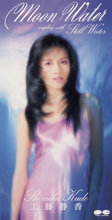
"Moon Water" is a song recorded by Japanese singer Shizuka Kudo, from her tenth studio album, Purple. It was released through Pony Canyon as the album's second single on May 19, 1995. When Kudo appeared on the AX tanpatsu drama Ren'ai Zenya: Ichido Dake 2 (1996) as a drawing-class model, the artwork she was the subject of is revealed to be a direct replication of the "Moon Water" cover art.
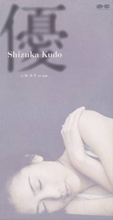
"Yū" is a song recorded by Japanese singer Shizuka Kudo, released as a single through Pony Canyon on June 5, 1996. It featured as the theme song on the ninth and penultimate installment of the Gokudō no Onna-tachi Yakuza film series, Gokudō no Onna-tachi: Kiken na Kake (1996), starring Kudo herself.

"Gekijō" is a song recorded by Japanese singer Shizuka Kudo, from her twelfth studio album, Dress. It was released by Pony Canyon as the album's lead single on November 7, 1996. It is the theme song of the CX television series Yuzurenai Yoru, starring Kudo herself. "Gekijō" was written by Miyuki Nakajima specifically for the drama; after reading the script, Kudo immediately thought of Nakajima for the soundtrack and sought to have her write the theme song. Nakajima's lyrics invoke the series' title, which loosely translates to "Unyielding Night".

"Kirara" is a song recorded by Japanese singer Shizuka Kudo. It was released as a single by Pony Canyon on July 17, 1998. Both "Kirara" and its coupling song, "In the Sky", were prominently featured on the CX television series, Kamisama, Mō Sukoshi Dake. Kudo performed the song on the 49th Kōhaku Uta Gassen, accompanied by Taro Hakase on the violin, marking her eighth and last appearance on the show. "Kirara" made its first album appearance on the compilation album, Best of Ballade: Current, for which Kudo also recorded an English version of "In the Sky".

Expose is the ninth studio album by Japanese singer Shizuka Kudo. It was released on September 7, 1994, through Pony Canyon. The album was recorded and mastered in Los Angeles. Expose is Kudo's first self-produced album. It yielded the two singles, "Blue Rose" and "Jaguar Line".


















